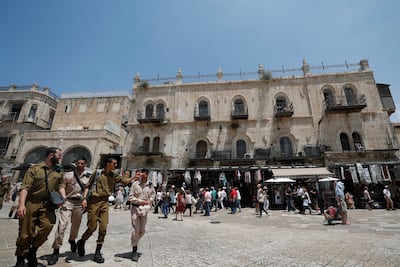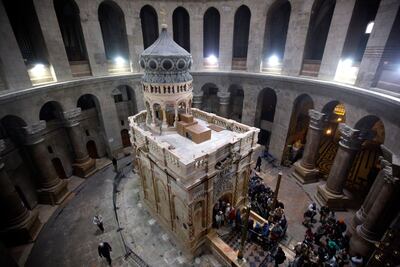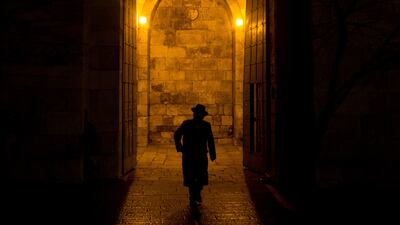On a walk into Jerusalem’s Old City, the very walls around Jaffa Gate indicate the storied history of the holiest places on Earth.
Subtle differences in colour are visible from the bottom to the top, each one a sign of an expansion over thousands of years as these walls guarded, in some form or other, the area’s Abrahamic identity.
The Old City's holiest Christian site, the Church of the Holy Sepulchre, which tens of thousands of pilgrims and tourists visit every year, is a 10-minute walk from Jaffa Gate.
It might seem that things are stable here — visitors are back after the Covid-19 pandemic and the ceremonies around Easter are continuing as ever.
But Christians in the Old City are worried, and there is mounting frustration that no one is listening.
Walking through Jaffa Gate, most visitors would be unaware that the three largest buildings on the left are embroiled in one of the most bitter disputes between Israelis and Palestinians: Israeli settlement activity.
One stalwart resident who most deeply fears the threat to Christians in the area is a Muslim, Abu Walid Dajani. The Imperial Hotel, which he manages, has been the target of a takeover attempt by a high-profile Jewish settler group, as have the nearby Petra Hotel and Little Petra Hotel.

Mr Dajani's grand office at the hotel is stuffed with binders of legal documents dating back decades, related to court cases about ownership of the establishment.
“Come in,” he beckons. “I will show you what’s really going on. Maybe I shouldn’t, but I don’t care. I’m an old man.”
The piles of paper are a physical representation of the weight Mr Dajani has borne for so long. A longtime friend reveals later that the hotel manager has not slept properly in years.
The Little Petra Hotel, just a few metres down the road, has already suffered the fate that Mr Dajani fears might soon befall the Imperial.
The guest house is easy to miss — flanked by a currency exchange and marked only by a worn-out sign above the entrance.
Like the Imperial and the Petra hotels, the property was owned by the Greek Orthodox Patriarchate.
But it is no longer receiving guests; a solid metal door blocks the entrance.
In March last year, settlers entered and occupied the hotel, prompting the Israeli advocacy group Peace Now to call for "immediate government intervention”.
Peace Now said the occupation was facilitated by Jerusalem police acting on "a dubious legal basis", a reference to alleged doctoring of the Greek Orthodox Patriarchate's records by a corrupt employee to back up the settler group's claims.

Hundreds of pilgrims from the local Christian community and abroad will walk past the hotel en route to the Holy Fire ceremony on Saturday at the Church of the Holy Sepulchre, where the permitted attendance has also become a deeply political issue.
For years, Israeli forces have enforced what many Christians say is an arbitrary cap on numbers.
There is a case for some controls. Ten thousand worshippers bearing torches in a centuries-old building could be dangerous. But Christians say they should be the ones making that decision, not Israeli authorities.
One senior church official related an anecdote to The National to illustrate the imbalance in power.
“One year, the Israeli Ministry of Foreign Affairs on its own accord started positioning foreign diplomats in the church, giving them the best view of the procession. They do not have the authority. This is our celebration and we do not distinguish between dignitaries and worshippers. They should mingle among the crowds and not have special privileges.”
With visitor numbers still recovering, fewer faithful will be making the walk this Saturday than throughout much of Holy Sepulchre’s history. Even fewer, apart from the Palestinians who have lived in the Old City for many centuries, will be aware of quite how bitter that walk has become.


